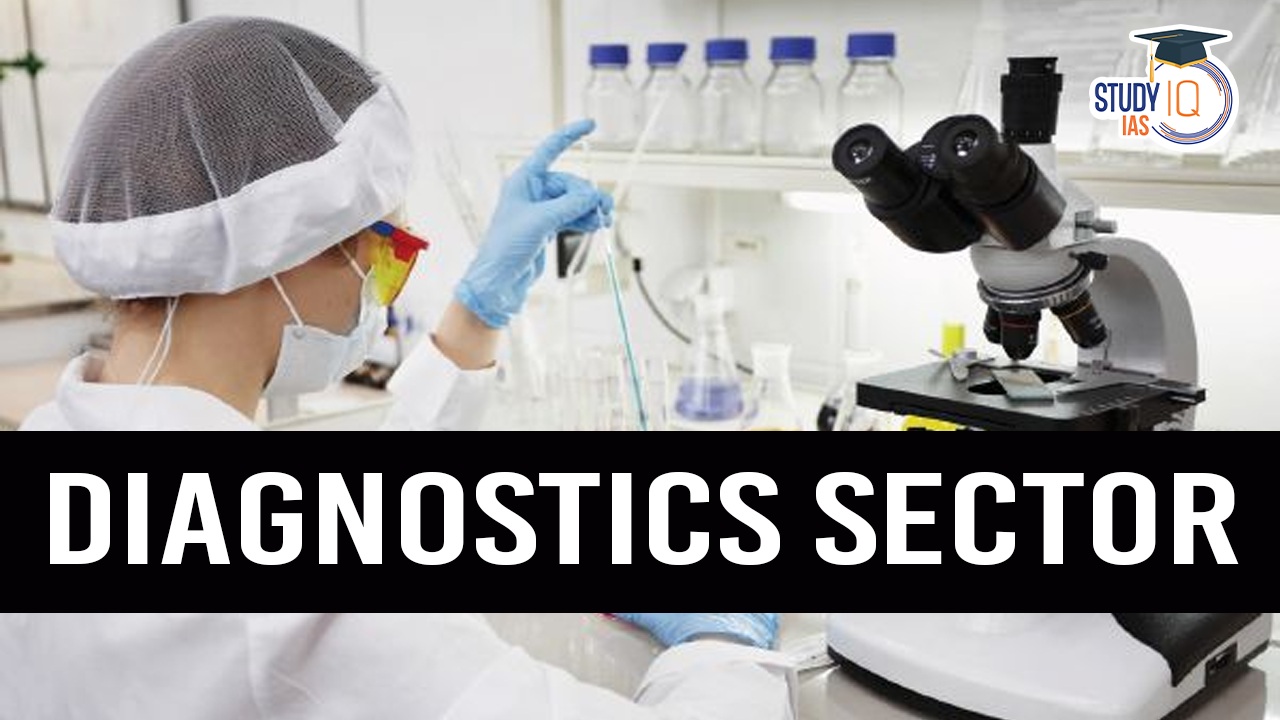Table of Contents
Context: India’s diagnostics sector is fast-growing but remains fragmented, under-regulated, and unevenly distributed.
| Facts |
|
Issues Affecting India’s Diagnostics Sector
Shortage of Trained Personnel
Lack of qualified pathologists, microbiologists, lab technicians, and radiologists.
- Many labs may not be able to employ well-trained staff, affecting quality.
- “Ghost employees and doctors”: labs obtaining licenses by falsely claiming to have qualified staff.
- Eg., a Final-year MD pathology student in Kolkata reports a huge workload (800+ tests/day) with serious staff shortages.
Under-Regulation and Poor Implementation
Fragmented market with many small, unorganized labs.
- Clinical Establishments Act (Registration and Regulation) 2010 was not fully adopted or implemented effectively across all states.
- Only 12 States and all Union Territories, except Delhi, have adopted this Act.
- Lack of a strong regulatory environment leads to varying standards.
- Lack of proper biomedical waste management, potentially leading to outbreaks.
- Eg., Tamil Nadu government’s announcement in 2009 to constitute a State Council for Laboratory Technicians is yet to be implemented.
Fragmented and Competitive Market
- Low barriers to entry.
- Many standalone players.
- This leads to inconsistent quality standards.
Varying Standards and Quality Concerns
Many labs are not accredited.
- Uneven quality standards due to a lack of resources for advanced technologies and inadequately skilled manpower.
- Emphasis is needed on the quality and accuracy of results.
Ethical Issues and Fraudulent Practices
“Bought out” signatures from doctors in exchange for money, without proper supervision.
- Labs fraudulently using doctors’ names and signatures.
- Technician-only facilities not run or owned by qualified pathologists.
- E-signatures by pathologists connected to multiple labs without limits on the number of labs.
Urban-Rural Divide
Diagnostics are concentrated in urban areas.
- Only 24% of diagnostics revenue is from rural areas (as of FY23), despite nearly 70% of the population residing rurally.
- Gaps exist in government labs, making them less favoured (lack of upgrades, limited operational hours, unavailability of specialists).
Pricing Problems
General concern regarding pricing in the private health sector.
- Telangana Diagnostics Programme (‘T-Diagnostics’) provides some relief by offering tests at no cost and has saved significant out-of-pocket expenses for patients.
- However, supply issues (e.g., reagents) can mar these programs.
Unrealistic Requirements
Lab representatives report that the space and educational requirements under the Kerala State Clinical Establishments Act are unviable.
- The State government also does not recognise paramedical degrees/diplomas even from recognised institutions in other states.
- Amendments to the Tamil Nadu Clinical Establishments (Regulations) Rules, 2018, stipulating minimum space for sample collection for clinical laboratories — 300 sq ft in rural areas and 500-700 sq ft in urban areas.
Way Forward
- Stronger Regulations & Enforcement: Make NABL accreditation mandatory for all diagnostic labs.
- Expand The Clinical Establishments Act to cover all States.
- Impose strict penalties for fake reports and ghost pathologists.
- Address Manpower Shortage: Set up specialized training programs for lab technicians.
- Increase microbiologist and pathologist recruitment in rural areas.
- Implement needs-based licensing to prevent lab saturation in urban areas.
- Improving Rural & Public Healthcare Infrastructure: Upgrade district hospital labs to reduce the burden on urban hospitals.
- Ensure free/subsidized diagnostic tests in government hospitals.
- Standardization of Pricing & Service Quality: Introduce government-regulated pricing for common diagnostic tests.
- Mandate uniform testing protocols for all labs.
- Public Awareness & Patient Rights: Educate patients on lab accreditation and quality checks.
- Set up grievance redressal mechanisms for diagnostic fraud complaints.


 Advanced Air Defence Radars: Types, Comp...
Advanced Air Defence Radars: Types, Comp...
 Ion Chromatography, Working and Applicat...
Ion Chromatography, Working and Applicat...
 Broadly Neutralising Antibodies (bNAbs):...
Broadly Neutralising Antibodies (bNAbs):...




















